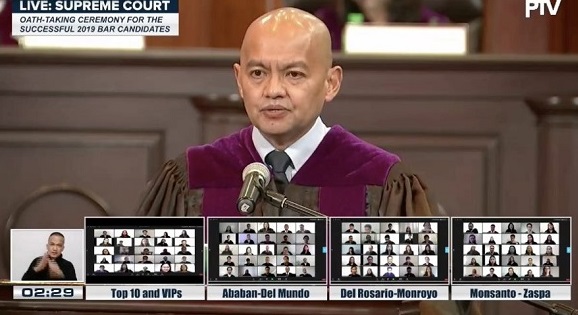Amid the Covid-19 pandemic, the Bar examinations in November this year will push through in a “digitized, localized, and proctored” modality — a first in the country’s history.

The Supreme Court (SC) issued Bar Bulletin No. 18, Series of 2021, last February, approving the digital Bar exams that will be conducted in local sites in the country, deviating from tradition of it being held in a university in Manila.
This came on the heels of the pilot (mock) Bar examinations conducted by the high court among 80 students through a computer software while being proctored in a testing room. This was done in Metro Manila, Baguio, Davao, and Cebu on January 31.
Proving that a “more equitable and inclusive” Bar exams can be done at the height of the pandemic, the SC decided to conduct a digitized one. This year’s Bar exams is for 2020-2021 after the high tribunal decided to postpone last year’s edition.
The person in charge of the first digitized Bar examinations is SC associate justice Marvic Leonen. As with tradition, this year’s Bar exams will be taken during the four Sundays of November (November 7, 14, 21, and 28).
The SC said the local sites have yet to be finalized, as it will still review applications based on minimum requirements that it will release. Applications for the testing sites will be accepted until April, with audit teams evaluating these areas according to the SC’s standards.
After the local sites are determined, the court will announce the guidelines for application to take the Bar examinations.
Meanwhile, the bulletin said Bar exam applications will be accepted via an online application system and this will start in May. Applicants need not go to Manila to visit the Office of the Bar Confidant, unless needed to verify the authenticity of documents submitted.
Those who have completed the requirements will be able to download the computer software to be used during the exams and will have the opportunity to familiarize themselves with it.
The SC also emphasized that examinees would have bring their own Wi-Fi-enabled laptops, which must have an integrated display screen, keyboard, and trackpad or pointer device, with sufficient internal battery power. The laptops must run on Mac or Windows operating systems.
Also, during the examination day, the computer hardware of the examines will be thoroughly checked by court personnel. The examinees will then be required to sign an “Honor Code” wherein examinees agree that once they commit cheating or help others cheat during the exams, they may be permanently disqualified for the current and future Bar examinations.
Below are the set of minimum system requirements for both Windows and Mac laptops needed by Bar examinees:
For Windows:
- Operating System: 32-bit and 64-bit versions of Windows 10 (versions: 1909, 2004, and 20H2) with the English (United States) Language Pack
- Only genuine versions of Windows Operating Systems are allowed
- CPU Processor: 2.0 GHz Intel i3 processor or equivalent
- RAM: 4GB or higher
- Hard drive: highest recommended for the operating system or 4GB of available space
- For on-site support, and in order to back up the answer files to a USB drive, a working USB port is required. (Newer devices may require an adapter)
- For technical troubleshooting, account, passwords, including BitLocker keys, may be required
- Internet connection for download, registration, exam download, upload and some exam features
- Screen resolution should be at least 1024 x 768
For Mac:
- Operating system versions: OS X 10.14 (Mojave), macOS Catalina (10.15), macOS Big Sur (11.0)
- Only genuine versions of Mac operating systems are allowed
- CPU: Intel processor. Devices using Apple’s Ml processor and Apple Rosetta 2 are allowed
- RAM: 4GB or higher
- Hard Drive: 4GB or higher available space
- For on-site support, and in order to back-up the answer files to a USB drive, a working USB port is required (newer devices may require an adaptor)
- For technical troubleshooting, account passwords including device passwords may be required
- Internet connection for download, registration, exam download, and upload
On the other hand, these are the lists for Windows and Mac that examinees should avoid, according to the SC bulletin:
For Windows:
- For now: alternate versions of Windows 10, such as Windows RT and Windows 10 S. If you are using a Microsoft Surface device, Windows 10 “S mode” is not compatible
- Tablet devices
- CPU Processor: Qualcomm Snapdragon chipsets
- Virtualized environments or environments that require a persistent network (local or otherwise) connections during secure exams. This includes, but is not limited to, VMWare, Parallels, Citrix workspace, virtual disks, streamed images, etc.
For Mac:
- A server version of Mac OS X
- Virtual operating systems such as Microsoft’s Virtual Machine Parallels, VMware, VMware Fusion, or any other virtual environments
- Virtualized environments or environments that require a persistent network (local or otherwise) connections during secure exams. This includes, but is not limited to, VMWare, Parallels, Citrix workspace, virtual disks, streamed images, etc.
The SC also said that proper health protocols will be strictly observed during the exams, including proper physical distancing in the testing rooms. Covid-19 testing will also be in placed in each of the testing sites.
“The Court will explore arrangements for a predominantly Saliva RT-PCR testing modality in each of the testing sites,” the SC said.




